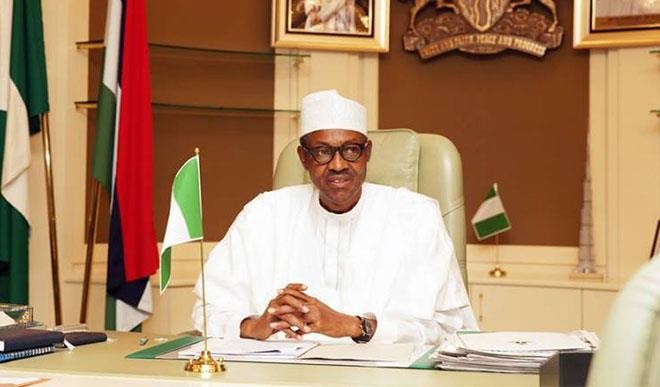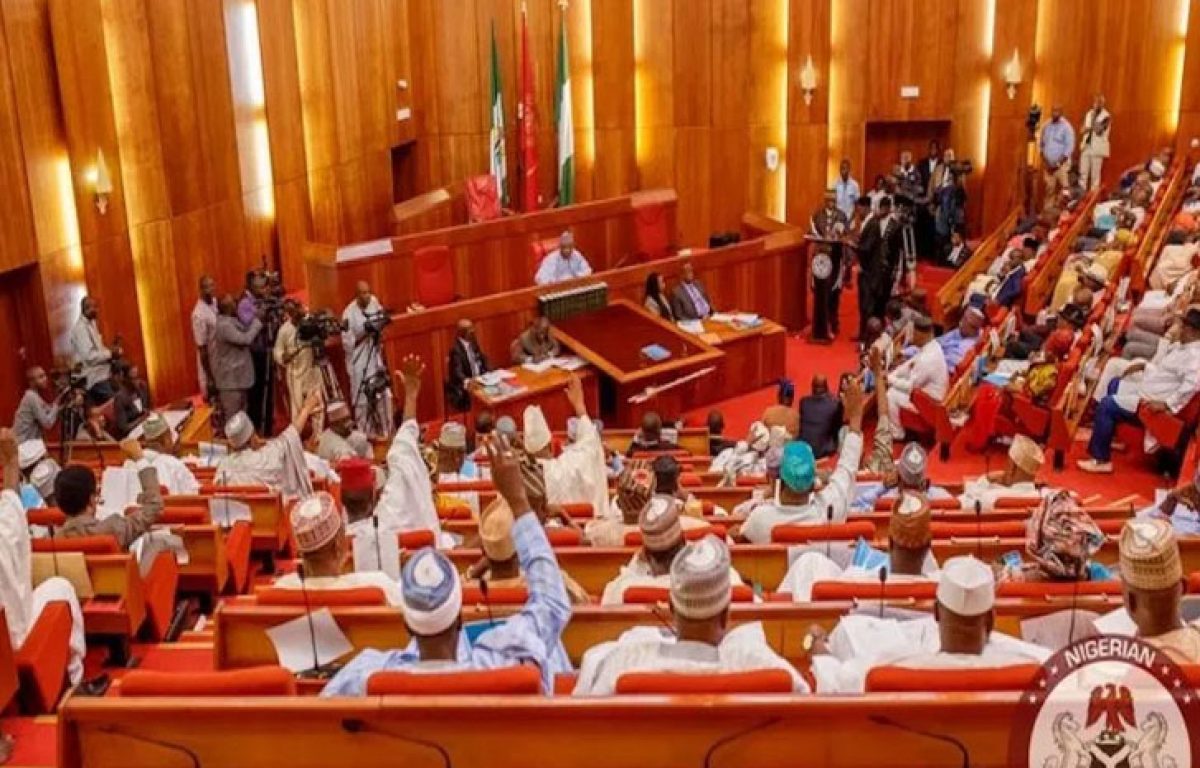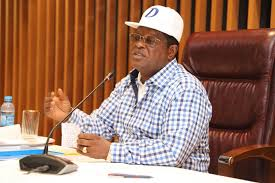Business
Oil Exploration to Commence in North East, Lagos Soon – Buhari

By Shola AKINGBOYE
President Muhammadu Buhari has disclosed that his administration has plans to extend oil and gas exploration into new fields in the Lake Chad Basin in the North East and in the coastal states, like Lagos, where oil has been discovered in commercial quantity.
Represented by Vice President Yemi Osinbajo, at the flag-off of the 6th African Petroleum Congress and Exhibition (CAPE VI) in Abuja, Buhari disclosed that, as part of strategies to reposition the Nigerian oil and gas industry, his government had commenced the process of implementing carefully conceived initiatives which would see the country hitting a production target of 2.8 million barrels per day (bpd) of crude oil.
The measures, he explained, would come in the form of reduction in production costs and increased efficiency in oil exploration so as to achieve a 30 per cent increase in daily production.
While noting that the event comes just before the 33rd Ordinary Session of the Council of Ministers of African Petroleum Producers Association (APPA), which also held concurrently, the president noted that CAPE VI provides a unique opportunity for Africa to look beyond the exploitation of oil and chart a new course in the use of other natural resources to upscale national revenues.
He speaks: “Current volatility in the oil sector allows lessons to be learnt, synergies to be built and new approaches to be adopted to enable Africa expand its economy, infrastructure, manpower base, maintain domestic and regional peace and protect the environment.”
He added that the use of gas in Africa’s future energy mix has become imperative, and that if Africa must meet her future energy needs, the issue of the development of a robust gas infrastructure must be jointly addressed.
While inviting all APPA member countries to enter into natural gas business with Nigeria, which currently has the 7th largest gas deposit in the world, the president asserted that it was unacceptable statistic for Nigeria to be responsible for 23 billion cubic meters of the 40 billion cubic meters of gas flared annually in Africa, even as he declared his resolve to partner with the legislature to ensure the signing of the United Nations Agreement of ‘Zero Routine Flaring by 2030.’
He said, “In Nigeria, gas flaring amounts to about 23 billion cubic meters per annum in over 100 flare sites, constituting over 13 per cent of global gas flaring. Nigeria is a member of the World Bank Global Gas Flaring Reduction (GCFR) Partnership and with the support of our legislature; we will sign the United Nations Agreement of Zero Routine Flaring by 2030, although our national target is 2020.”
Buhari, however, stressed that in processing Africa’s hydrocarbon resource, environmental issues must be accorded huge priority.
He explained that “globally, over 150 billion cubic meters of associated gas is flared annually. Of this figure, Africa flares an estimated 40 billion cubic meters annually. I urge all APPA member countries to set realistic targets for gas flare-out in the region.”
Noting that the development of domestic refining capacity in oil and gas is critical to sustainable economic growth, Buhari challenged African ministers of energy to further explore cooperation mechanisms to expand regional refining capacities in an efficient and cost effective manner.
APPA was inaugurated as a regional economic association in January, 1987, and it has grown to 18 member countries, namely, Ghana, Cameroon, Algeria, Mauritania, Gabon, Cote D’Ivoire, Equatorial Guinea, Congo DR, Congo Brazzaville, Chad, Benin, Niger, Libya, Egypt, Sudan, Angola, South Africa and Nigeria, which currently chairs the association.
On PIB and unbundling of NNPC, the president stated that African oil producers are confronted with huge challenges that require urgent changes in the managerial strategies deployed within its economies, while reiterated his administration plans to strengthen the institutional framework on policy formulation through legislation on the Petroleum Industry Bill (PIB) as a prerequisite for the development of the sector and attraction of foreign investment.
He listed the strategies to include unbundling the Nigeria National Petroleum Corporation (NNPC) into lean, efficient and profitable components that will operate as a business venture and deploy existing manpower to areas of competences without attendant job losses, develop stronger policies on local content so as to reduce capital flight in the industry and the reduction of gas flaring through Joint Venture (JV) contracts that will expand infrastructure and deploy Liquefied Natural Gas.
On the significant of the CAPE VI event and the NNPC as host, the Nigerian minister of state for petroleum and OPEC President, Dr. Ibe Kachikwu, called on African governments to develop policies that will enable backward integration.
“Unity is fine, coming together is fine, what we need is opening up the space so that investment will happen. My expectation is that we further consolidate on what is happening with oil pricing at the moment, everybody has realized there is common need for consolidation in finding lasting solution to the current imbroglio in the sector
“It is a new dawn for Africa and we are excited about the development. We will continue to work collaboratively because there is a lot happening in the space but also a lot of challenges that we have to overcome.
“The major challenge is funding. Obviously skillsets are there already and technology is not an issue but funding remains key. Policies are also key because African governments have to develop policies that will enable backward integration into their own systems.” Kachukwu said.
Not few speakers at the event emphasized on the need for petroleum producers among the African countries to consider oil and gas sector as tertiary, but to think outside the box for their economic survival, saying future of the current trend in the global oil market is bleak.
This year’s event has the theme, “Positioning African Petroleum for Global Development and Value Addition.”
Business
Senate Committee Commends Tinubu on Launch of National Halal Economy Strategy to Tap $7.7trn Global Market*

The Senate Committee on Finance has commended President Bola Ahmed Tinubu for launching Nigeria’s National Halal Economy Strategy, describing it as a bold and strategic move to position the country within the lucrative global halal market, estimated at $7.7 trillion.
In a statement signed by its Chairman, the committee praised the initiative as timely and aligned with international best practices. Several countries—including the United Kingdom, Canada, Australia, Malaysia, Indonesia, Saudi Arabia, the United Arab Emirates, Turkey, Brazil, Thailand, and Singapore—have successfully used halal frameworks to boost manufacturing, agricultural exports, financial markets, and foreign investment.
The committee highlighted Nigeria’s strong advantages for success in this space, including its vast agricultural resources, large domestic market, youthful population, growing manufacturing sector, and expanding services industry.
It noted that the strategy fits seamlessly into the Tinubu administration’s broader economic reforms, such as boosting non-oil revenue, diversifying exports, creating jobs, supporting small and medium enterprises (SMEs), and increasing foreign exchange earnings.
President Tinubu, represented by Vice President Kashim Shettima, officially unveiled the strategy on Thursday, February 6, 2026, at the Presidential Villa in Abuja.
The framework, developed in collaboration with Saudi Arabia’s Halal Products Development Company (HPDC) following a bilateral agreement signed in February 2025 at the Makkah Halal Forum, aims to enhance quality standards, certification processes, and competitiveness across sectors like food, pharmaceuticals, cosmetics, tourism, and ethical finance.
The committee described the strategy as inclusive, market-driven, and globally oriented, while fully respecting Nigeria’s diverse and pluralistic society.
It is projected to contribute significantly to the economy, with estimates suggesting it could add around $1.5 billion to Nigeria’s GDP by 2027 and unlock billions more in domestic value over the coming decade through expanded exports and investment.
The Senate Committee on Finance pledged its full legislative support, oversight, and cooperation to ensure smooth implementation, regulatory clarity, and long-term fiscal sustainability in the national interest.
“This decisive step reinforces Nigeria’s readiness to adopt proven international models, unlock new economic frontiers, and establish itself as a competitive player in the evolving global economy,” the statement concluded.
Business
Ex-Naval Chief Named in ₦100m Property Transaction Dispute
A property transaction dispute has emerged involving Zoe New Dawn Nigeria Limited and a former Chief of Naval Staff, following claims by the company’s chairman, Engr. Dr. Stephen Achema Akpa, that a ₦100 million payment made for land was not followed by a transfer of ownership.

According to Akpa, the payment was made in connection with a land transaction reportedly facilitated by the former naval chief. He alleged that despite documented payments, the land in question was neither transferred to the company nor was the money refunded.
Akpa said Zoe New Dawn Nigeria Limited possesses transaction records and related documents which, he claims, support its position in the dispute. He added that the company has initiated steps to seek redress through appropriate legal channels.
The matter has drawn attention due to the profile of the parties involved, particularly against the backdrop of recurring disputes linked to land ownership and property transactions in Nigeria’s real estate sector.
Industry observers note that unresolved land transactions remain a common source of litigation, often arising from disagreements over title documentation, intermediaries, and contractual obligations.
Zoe New Dawn Nigeria Limited stated that it intends to pursue the matter through lawful means to determine liability and recover any funds deemed outstanding.
As of press time, no official response had been issued by the former Chief of Naval Staff regarding the allegations. The dispute has not yet been confirmed as the subject of any court proceedings.
Business
Umahi Inspects Lekki Corridor’s 7th Axial Road Project, Expresses Confidence in CHEC

Minister of Works Senator Dave Umahi over the weekend inspected the progress of the 7th Axial Road project in the Lekki Corridor of Lagos.
The project, located behind the Dangote Refinery, is a crucial cargo handling route for the Lekki Deepwater Port and connects the Lekki Corridor with the Sagamu route.
The Minister expressed confidence in China Harbour Engineering Company Limited (CHEC), the project’s contractor, citing its successful delivery of the Lekki Deepwater Port and high-quality progress on the Makurdi-Enugu road reconstruction and expansion project. Umahi instructed that the roadbed filling work for Project LOT1 be completed by the end of April and directed the project team to accelerate resource input and tangible works to meet the deadline.
The 7th Axial Highway is expected to synergize with key infrastructure projects like the Coastal Road, Dangote Road, and Lekki Port, creating a comprehensive transportation hub model and boosting Nigeria’s port economy and industrial corridor. Umahi emphasized the need for environmental protection agencies to ensure efficient construction and steady progress while maintaining ecological safety.
A representative of CHEC who spoke during the inspection stated that the company would maintain a high level of resource input, implement the Minister’s directives, and coordinate safety, quality, and environmental protection to ensure the project’s timely and high-quality completion in other to unluck its port relief and regional economic benefits.
-

 Uncategorized5 years ago
Uncategorized5 years agoFG, states urged to harness flooding for ranching, others with technology – Agbaje
-

 Headlines10 years ago
Headlines10 years agoBreaking: EFCC seals Borno House of Assembly, as Hon members take to their heels
-

 News12 years ago
News12 years agoNigeria Security Operatives Stage Manhunt For Homosexual Perpetrator
-

 News9 years ago
News9 years agoHow 21-year-old Girl fled community over accusation of lesbianism
-

 News10 years ago
News10 years agoYobe Gov Moves Against Deputy
-

 Opinion7 years ago
Opinion7 years ago7 signs she has friend zoned you
-
Technology4 years ago
Online job placement company headhunts women
-

 Headlines10 years ago
Headlines10 years agoBorno Dep Gov Abducts Another Church Leader





